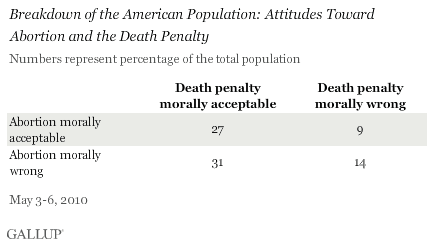The state of Virginia executed Teresa Lewis on Thursday night, the first woman to be put to death in that state since 1912. Lewis had been convicted of the murder of her husband and son back in 2002. As is usually the case with executions, there were protests. Thousands signed petitions asking that her life be spared, and according to the Washington Post, groups such as the Virginia Catholic Conference and the Virginia Conference of the United Methodist Church all objected.
It is likely that the state-sanctioned killing of Lewis did not create attitudinal problems with the majority of Americans. Our latest Gallup data show that:
- Sixty-five percent of Americans favor the use of the death penalty for a person convicted of murder.
- Half of Americans say that the death penalty is not imposed often enough; only 20% say it is imposed too often.
- A majority say the death penalty is applied fairly in this country.
- In 2002, 68% of Americans said they favored the death penalty for women.
At the same time, only 13% favor the use of the death penalty for someone who is mentally retarded, which was one of the arguments used in the case of Lewis, who had been characterized as having a low IQ.
As noted, the Virginia Catholic Conference was one of those protesting the executive of Teresa Lewis. The Catholic position on the death penalty is not totally black and white, but Pope John Paul II said in 1999: "I renew the appeal I made most recently at Christmas for a consensus to end the death penalty, which is both cruel and unnecessary."
Our data show that rank-and-file Catholics in the U.S. are only slightly less likely than the overall population to find the death penalty morally unacceptable -- 61% versus 65% for the total population in our most recent May survey.
One might also think that those who oppose the death penalty would be opposed to abortion, since both involve what has been defined as the taking of lives. But that's not the case. Take a look at these data from our May Values survey.

Thirty-one percent of Americans say that the death penalty is morally acceptable -- but at the same time say that abortion is morally wrong.
Twenty-seven percent say that the death penalty and abortion are morally acceptable, which seems a bit more mentally congruent. Only 14% adopt what might seem like the other coherent position -- the death penalty is wrong and abortion is wrong.
By the way, Gallup first asked Americans about the death penalty in 1936, the year that Franklin Roosevelt was elected to his second term as president, in the midst of the Depression, and the year in which actor Alan Alda and TV host Dick Cavett were born. This death penalty question was one of the first asked by Dr. George Gallup in his then nascent Gallup poll. The results? Fifty-nine percent at that point in history said the death penalty was morally acceptable, fewer than today.
You may be asking what the all time high point for death penalty support has been over the past 74 years? The answer: 80%, in 1994. The all-time low, 42%, came in 1966 a year before the so-called "voluntary moratorium" on the death penalty that lasted from 1967 and 1972.
One other fact of interest: When we asked Americans a few years ago to tell us why they favored the death penalty, the four most frequently occurring answers were, in order, "an eye for an eye," "fits the crime"; 2) they deserve it; 3) save taxpayers the money involved in keeping murderers in prison; and 4) deterrent for potential crimes.
